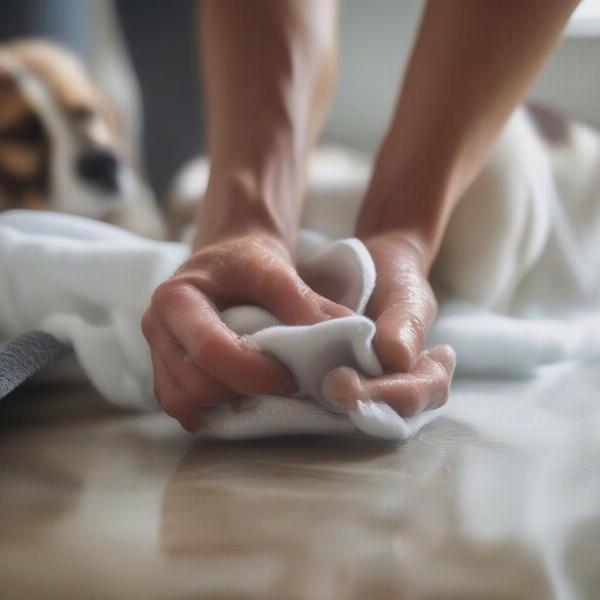A dog ripped pad is a common injury, especially for active dogs. Whether it’s a small scrape or a deeper tear, a damaged paw pad can cause your dog significant pain and discomfort. Understanding the causes, treatment, and prevention of these injuries is crucial for any responsible dog owner. This article will provide you with all the information you need to care for your dog’s paw pads and ensure their happy, healthy paws.
Understanding Dog Paw Pad Injuries
Your dog’s paw pads are their first line of defense against the elements and rough terrain. They provide cushioning, traction, and protection. A ripped pad, also known as a cut or laceration, can occur from various sources, including hot pavement, sharp objects like glass or metal, rough surfaces, and excessive running or playing. The severity of a ripped pad can range from a minor abrasion to a deep wound that exposes underlying tissue.
Recognizing the Signs of a Ripped Pad
If your dog is limping, licking their paw excessively, or you notice bleeding or swelling on their paw pad, they may have a ripped pad. You might also see visible debris embedded in the pad. In some cases, the tear might be small and difficult to see, so it’s important to pay attention to your dog’s behavior.
Treating a Dog Ripped Pad at Home
For minor scrapes or abrasions, you can often treat the injury at home. Start by cleaning the paw with warm water and mild soap. Remove any debris gently. Apply an antiseptic solution and bandage the paw to prevent infection and further injury. Keep the bandage clean and dry, changing it daily.
 Cleaning a dog's injured paw pad
Cleaning a dog's injured paw pad
When to Seek Veterinary Care
If the wound is deep, bleeding profusely, or shows signs of infection (such as pus, redness, or swelling), you should seek veterinary care immediately. Deep cuts may require stitches, and infections can lead to serious complications if left untreated. Your vet will assess the injury and recommend the best course of action, which might include antibiotics, pain medication, or even surgery in severe cases.
Preventing Dog Ripped Pads
Prevention is always better than cure. Avoid walking your dog on hot pavement, especially during the summer months. Check your dog’s paws regularly for cuts, thorns, or other debris. Keep your yard free of sharp objects and hazardous materials. Consider using dog booties for extra protection in challenging terrain.
Conclusion
A dog ripped pad can be a painful experience for your furry friend. By understanding the causes, recognizing the signs, and knowing how to treat and prevent these injuries, you can help keep your dog’s paws healthy and happy. Remember to always consult a veterinarian if you are unsure about the severity of the injury or if it doesn’t seem to be healing properly.
FAQ
- How long does it take for a dog’s ripped pad to heal? Minor scrapes can heal within a week or two, while deeper tears may take several weeks or even months.
- Can I use human antiseptic on my dog’s paw? While some human antiseptics are safe for dogs, it’s best to use a product specifically designed for pets.
- My dog keeps licking their paw, even with a bandage. What should I do? An Elizabethan collar (cone) can prevent your dog from licking the injured paw and interfering with the healing process.
- Are there any natural remedies for ripped paw pads? Some natural remedies, like honey or aloe vera, may have soothing properties, but always consult your vet before using them.
- What are the signs of an infected paw pad? Signs of infection include increased redness, swelling, pus, a foul odor, and excessive licking or chewing of the paw.
Related Articles:
About ILM Dog
ILM Dog is your trusted global resource for expert dog care advice and information. We provide practical guidance on all aspects of dog ownership, from breed selection and health care to training, nutrition, and product recommendations. Whether you’re a first-time dog owner or a seasoned expert, ILM Dog offers reliable information to help you provide the best possible care for your canine companion. Contact us for personalized advice at [email protected] or call +44 20-3965-8624.